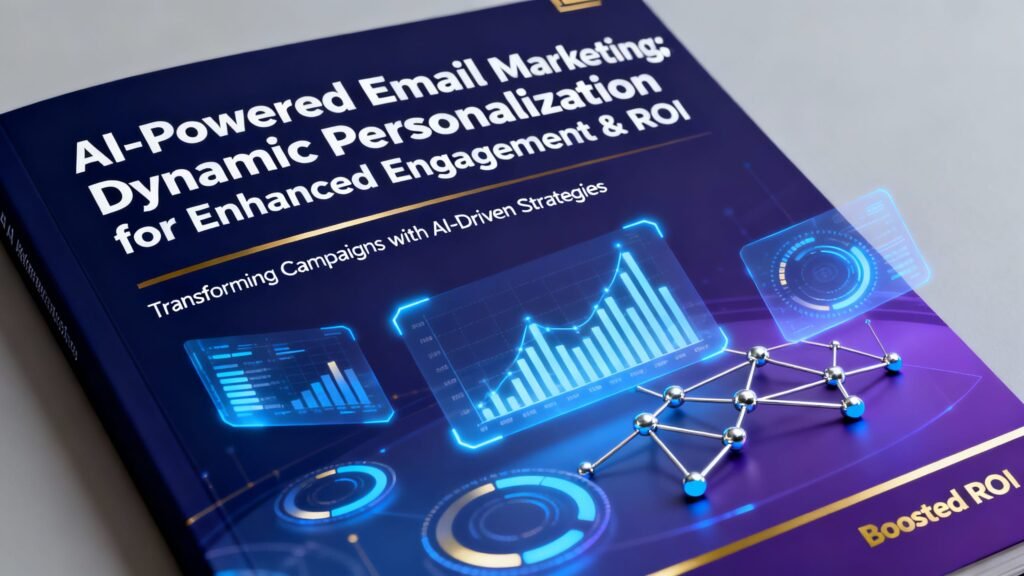
Introduction
Email marketing has been around for decades, yet it remains one of the most effective digital marketing channels. Despite the rise of social media, paid advertising, and influencer campaigns, email continues to deliver unmatched ROI. According to industry reports, every $1 spent on email marketing generates an average return of $36.
But email marketing in 2025 looks very different from the batch-and-blast campaigns of the past. Customers no longer tolerate generic emails that clutter their inboxes. They expect messages that are personalized, timely, and relevant to their needs. Thanks to artificial intelligence (AI) and advanced personalization techniques, email marketing has been reinvented into a smarter, more efficient, and higher-converting strategy.
In this article, we’ll explore how AI and personalization are transforming email marketing, the benefits and challenges of this new era, practical strategies for businesses, and how our agency helps clients boost ROI with email.
Why Email Marketing Still Matters
Before diving into innovations, let’s revisit why email marketing remains critical in the digital marketing mix:
- Direct Communication: Email delivers messages straight to customers’ inboxes without relying on algorithms.
- Ownership: Unlike social media, businesses own their email lists.
- Cost-Effectiveness: Email marketing is inexpensive compared to paid advertising.
- Measurable Impact: Every open, click, and conversion can be tracked.
- Versatility: Emails can serve multiple purposes—promotions, education, relationship building, and retention.
The Role of AI in Email Marketing
AI has taken email marketing from a static tool to a dynamic, intelligent channel. Here’s how:
1. Predictive Analytics
AI predicts customer behavior by analyzing past actions. For example, it can forecast which products a customer is likely to buy and trigger automated emails with relevant offers.
2. Advanced Segmentation
Instead of grouping customers only by demographics, AI creates micro-segments based on browsing habits, purchase history, and even real-time behavior. This ensures highly targeted campaigns.
3. Automated Content Generation
AI can generate subject lines, email copy, and product descriptions that match a customer’s preferences. It tests multiple versions and selects the best-performing one.
4. Send Time Optimization
AI determines the best time to send an email to each individual subscriber, increasing the chances of opens and clicks.
5. Dynamic Personalization
AI ensures emails are tailored in real-time. For example, a customer browsing travel packages might immediately receive an email highlighting relevant destinations and offers.
Personalization Beyond First Names
In the past, personalization meant inserting a subscriber’s name into the subject line. Today, it’s much deeper:
- Product Recommendations: Based on browsing history or abandoned carts.
- Behavior-Triggered Emails: Welcome emails, re-engagement campaigns, and follow-ups.
- Location-Based Offers: Highlighting events or stores near the subscriber’s location.
- Lifecycle Marketing: Different content for first-time buyers versus repeat customers.
- Dynamic Content Blocks: Different subscribers see different versions of the same email.
This level of personalization makes emails feel like one-to-one conversations rather than mass promotions.
Benefits of AI and Personalization in Email Marketing
- Higher Open Rates: Personalized subject lines and send-time optimization capture attention.
- Better Engagement: Content tailored to interests increases click-through rates.
- Improved Conversions: Relevant offers drive purchases more effectively than generic promotions.
- Reduced Churn: Re-engagement campaigns keep subscribers connected.
- Increased ROI: Efficient targeting ensures resources aren’t wasted on uninterested audiences.
Real-World Examples
Amazon
Amazon is a master of personalized email marketing. Every email is tailored with product recommendations based on past behavior, making customers more likely to purchase.
Spotify
Spotify sends personalized “Wrapped” emails summarizing each user’s music habits. These campaigns drive massive engagement and social sharing.
Netflix
Netflix uses AI to send recommendations for shows and movies based on a user’s viewing history, keeping audiences engaged with the platform.
Challenges of Reinvented Email Marketing
Data Privacy and Compliance
With GDPR, CCPA, and other regulations, businesses must collect and use data responsibly.
Technology Costs
AI-powered email platforms like Klaviyo, Salesforce Marketing Cloud, and HubSpot require investment.
Skill Gaps
Teams need training to leverage advanced tools effectively.
Risk of Over-Personalization
Too much personalization can feel invasive, damaging trust.
Practical Strategies for Businesses
- Invest in the Right Tools – Choose AI-powered email platforms that integrate with your CRM and website.
- Start with Segmentation – Begin by grouping customers by behavior and gradually expand personalization.
- Leverage Automation – Set up behavior-triggered campaigns such as abandoned cart reminders or post-purchase follow-ups.
- Focus on Quality Content – Even with AI, authentic and valuable content drives results.
- Test and Optimize – Continuously A/B test subject lines, content, and send times.
- Ensure Compliance – Be transparent about data usage and give customers control over preferences.
The Future of Email Marketing
Looking ahead, email marketing will become even more intelligent and personalized:
- AI-Powered Chat Integration: Emails will link seamlessly with chatbots for instant support.
- Hyper-Personalization: Emails will adapt to customer moods and contexts in real-time.
- Voice-Activated Emails: Subscribers may access and respond to emails using voice assistants.
- In-Email Transactions: Customers will complete purchases directly within the email.
How Our Agency Helps Clients
At our digital marketing agency, we help businesses reinvent their email strategies by combining creativity, AI, and personalization. We provide:
- AI-powered segmentation and targeting.
- Automated campaigns tailored to the customer lifecycle.
- Engaging, personalized content creation.
- Ongoing optimization based on analytics.
- Compliance management to protect customer trust.
Our goal is to turn your email list into a powerful revenue engine.
Conclusion
Email marketing is far from dead—in fact, it’s stronger than ever in 2025. Reinvented by AI and personalization, it has evolved into one of the smartest, most effective ways to engage customers and drive ROI. Businesses that adapt to these innovations will enjoy higher open rates, deeper customer relationships, and stronger sales growth.
At our digital marketing agency, we partner with businesses to unlock the full potential of email marketing. Whether it’s advanced segmentation, behavior-triggered automation, or dynamic personalization, we ensure your campaigns deliver measurable results.
Email is no longer about sending messages—it’s about creating personalized conversations that drive lasting customer loyalty.
